Cryotherapy
substance and mechanisms of cold therapy
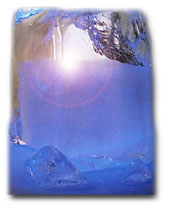
What is cryotherapy?
Cryotherapy is cold treatment. Cryotherapy is
the use of cold to remove heat from the tissue in case of inflammatory or
feverish processes.
In addition to balneotherapy (medicinal baths), cryotherapy is one of the
oldest forms of therapy, having been in use since antiquity.
Cryotherapy is widely used today in traumatology and sports medicine.
Cryotherapy is of enormous importance, not only because it is very easy to
apply, but particularly because patients can be treated without medication
or at least with considerably reduced medication.
What are the effects of cryotherapy?
Thermosteresis (heat removal) is used for all
indications applicable in human medicine (all stages of acute inflammation,
acute post-traumatic or feverish states). Cryotherapy results in reduced
circulation, thus inhibiting or at least considerably reducing the
activation of inflammation mediators (transmitters), for example, bradykinin
or serotonin.
However, the STÜBBEN KRYO KOMPAKT HORSE cold compress (which has been familiar in
international equestrian sport for years, having been tested by the former
veterinary of the German dressage team, Dr. Gerhard Grenz) has much more to
offer.
The compress has proved extremely effective in postoperative applications,
for preventing swelling and pain, in the acute treatment of oedemas,
haematomas and swelling of the tendons, in acute inflammatory processes such
as phlegmon, tendinitis and tenosynovitis.
It has proved itself.
Long-term cryotherapy
Warmth removal will only be effective if a cold
medium with a sufficiently low temperature is placed on the organ concerned
for a sufficiently long time. When treating acute conditions, everything
else is an illusion.
Short-term application of cold, for example with natural ice, cooling gels
or water therapies according to Kneipp (hosing) result in warming after
application. The tissue treated will then be better supplied with blood,
inflammation and pain will increase.
Cryotherapy in equestrian sport up to now
Not only does the popular method of hosing the
horse's legs after sports activity for a more or less long period - 10 to 20
minutes - have no therapeutic effect, it is also completely uneconomical (water
consumption).
In the acute phase (after activity), the metabolism has to be inhibited, and
this can only be done by means of a sufficiently low temperature for a
longer period.
Circulation is only required for rehabilitation of tissue after the acute
phase. In a subacute or chronic stage, inflammation mediators should be
subjected to positive influence.
A suitable medium is required for lasting thermosteresis (heat removal). As
tests have shown, the product STÜBBEN KRYO KOMPAKT HORSE is ideally suited for this
purpose. It is a specially developed cold medium containing
microscrystalline ice when frozen (about 50% volume by weight). It makes a
lasting removal of heat possible, and since the development of the cold is
slowed down (method protected by international patent), there is no danger
of frost injury.
The cold mass remains free of pieces of sharp ice and troublesome meltwater,
and even at contact temperatures down to minus 22 degrees Celsius it is
readily mouldable and agreeably soft.
Studies have shown that after local application for about 30 minutes, a
reduction of body temperature by more than 10 degrees Celsius is reached (which
is within the therapeutically desired range) and that this level is
maintained for more than 3 hours.
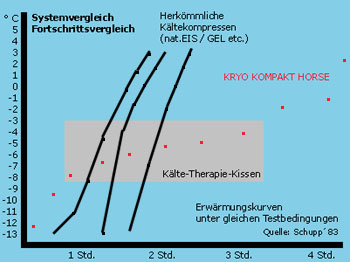
The total duration of cold supply was
significantly more than 5 hours.
These impressive test results are evidence that STÜBBEN KRYO KOMPAKT HORSE has the
qualities which are required on scientific grounds and that it is
extraordinarily suitable for effective long-term cryotherapy.
- sufficient cold capacity without frost
injury despite low contact temperature
- rapid release of cold (immediate effect)
due to thawing of microcrystalline ice
- necessary depth of effect
- no dermatological damage (such as occurs
with chemical cold compresses, for example)
- highly economical due to frequent reuse
These are the significant practical advantages
of the product; they make it distinctive and unique.
Cooling with normal ice
An ice bag will only bring about the desired
cold for a short period. The disadvantage is, however, that this brief cold
stimulus will increase the circulation in the blood vessels immediately
after application.
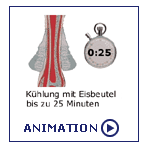
The result is activation of the inflammation
mediators and an increase in the horse's sensitivity to pain.
Cooling with gel packs and pads
Gel packs are unsuitable for long-term cold
therapy.
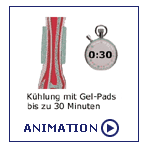
They are not temperature controlled and
therefore cause cryalgesia (cold pain) and burns. The recommended short-term
application activates the inflammation and increases the sense of pain.
Cooling with STÜBBEN KRYO KOMPAKT HORSE cold compresses
When deeply frozen, STÜBBEN KRYO KOMPAKT HORSE contains
fine ice crystals in an emulsion which melts between minus 9 and minus 2
degrees Celsius.
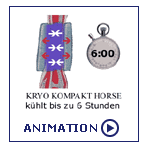
The well controlled influx of cold ensures that
frost injury and cryalgesia (cold pain) will not occur. This makes it
possible for treatment to be uniform, longer lasting and particularly
effective. The extraordinary cooling performance has been scientifically and
clinically demonstrated. It has proved to be excellent in practice - also in
human medicine. The world elite in dressage riding, show jumping,
three-day-event and western riding put their trust in it.
|